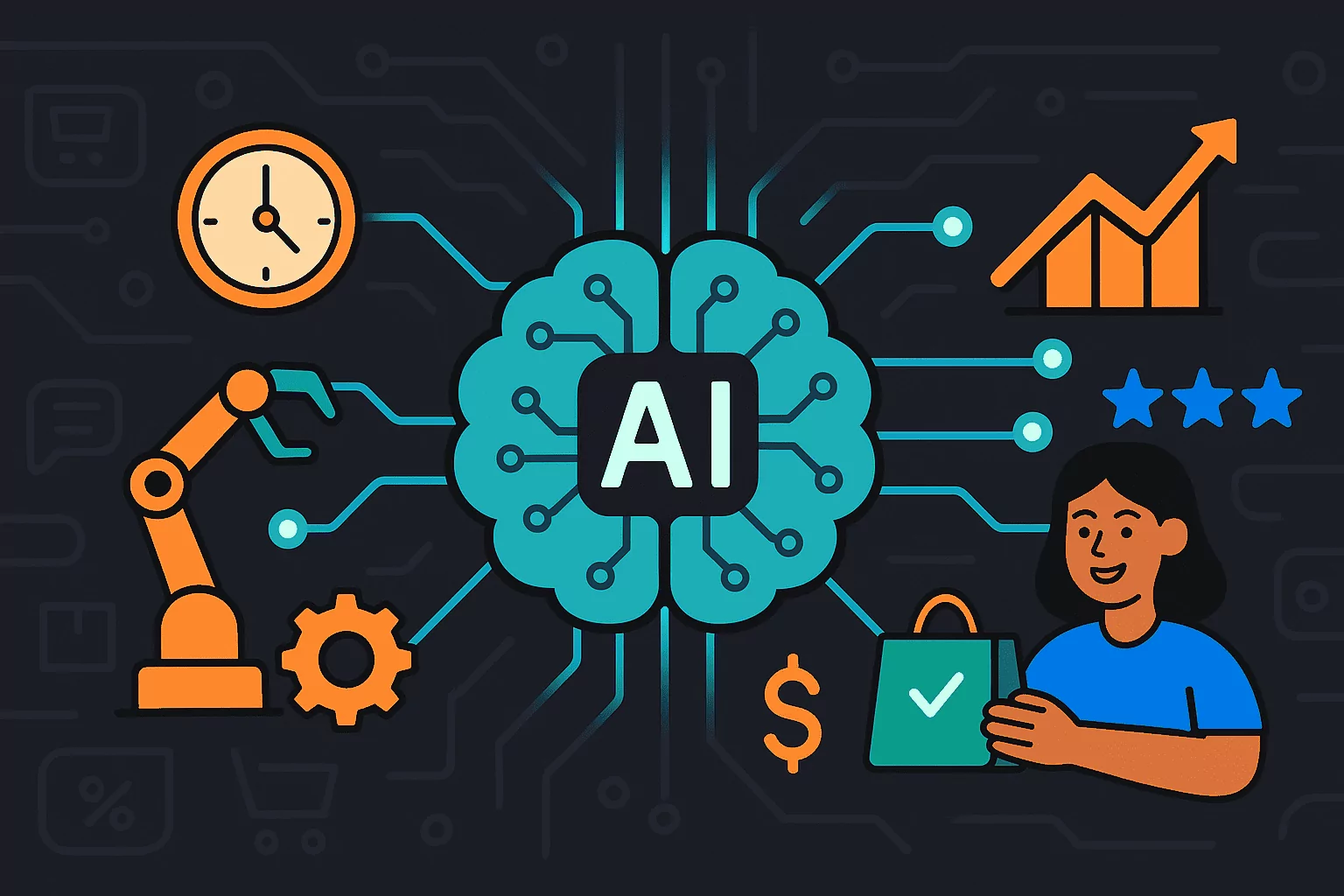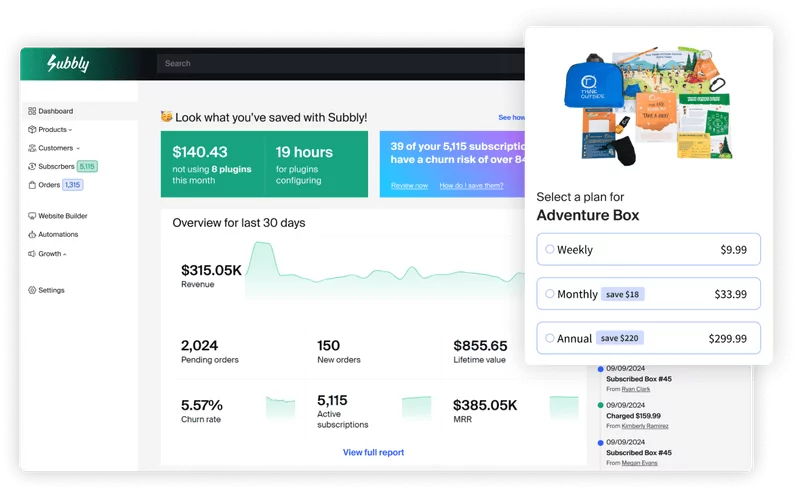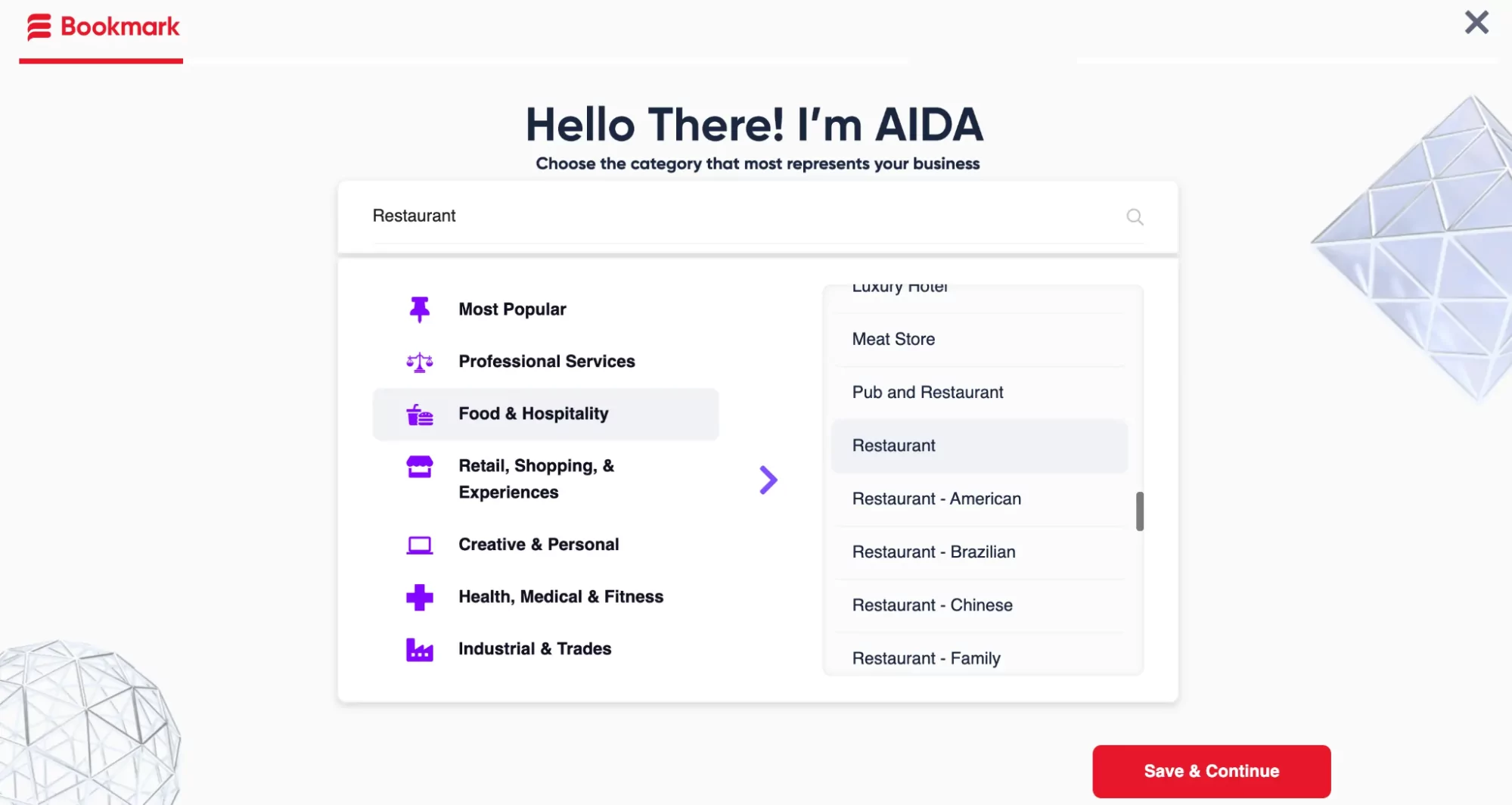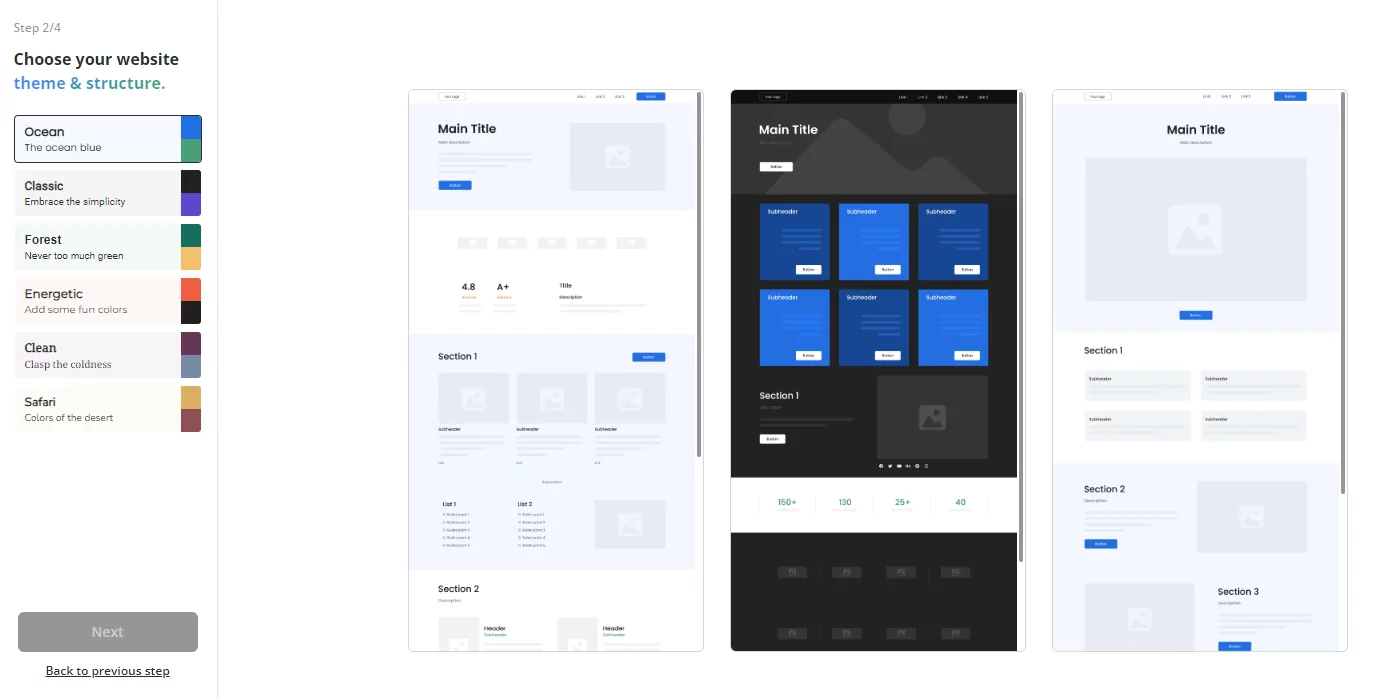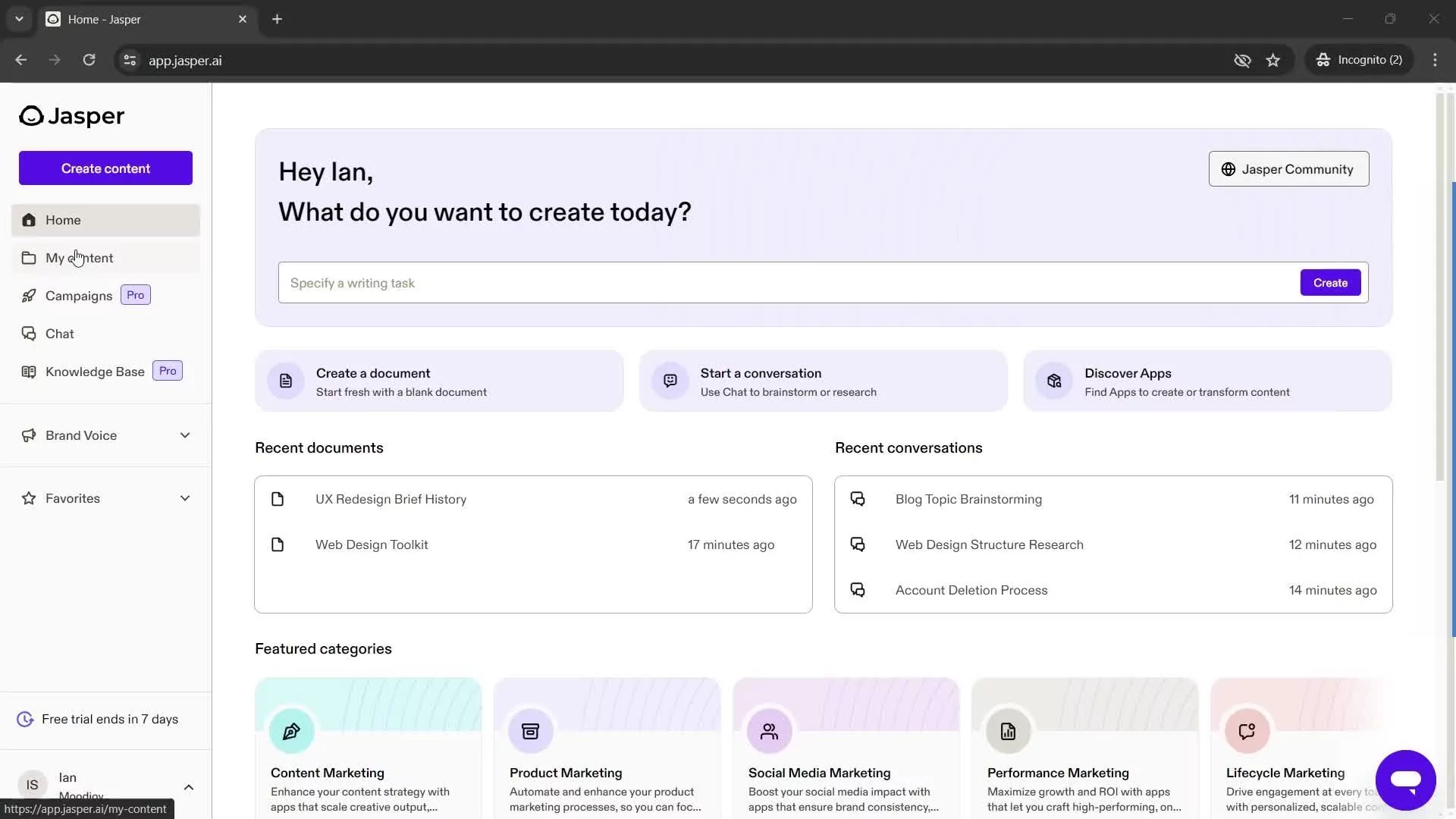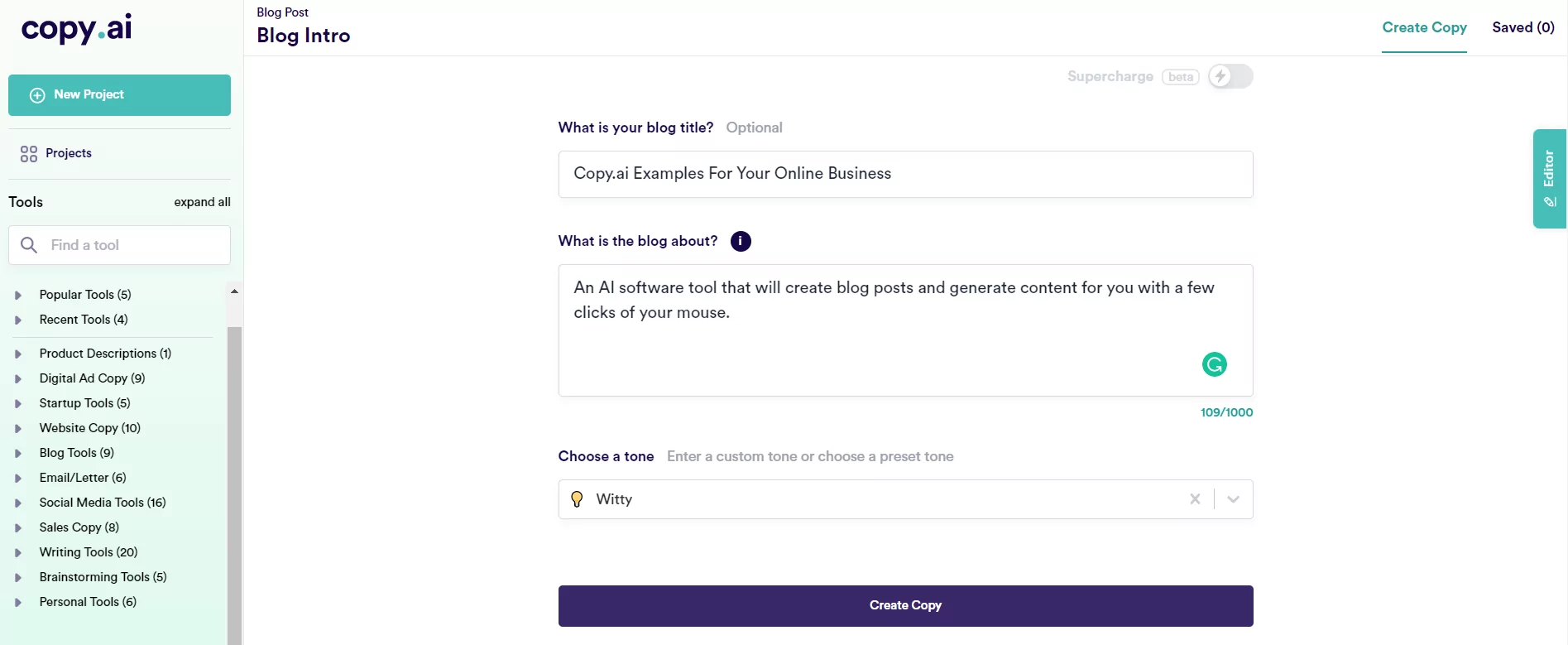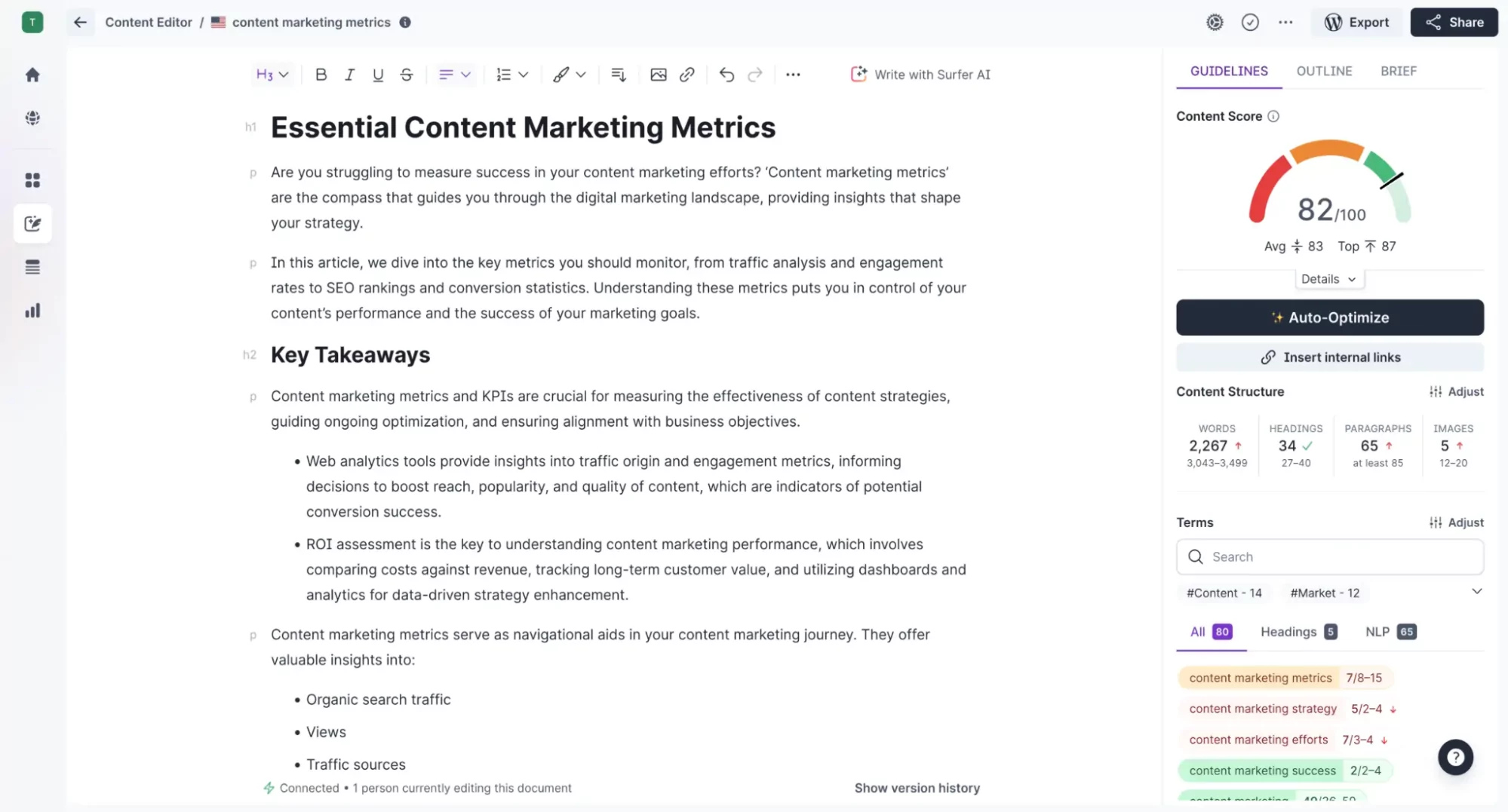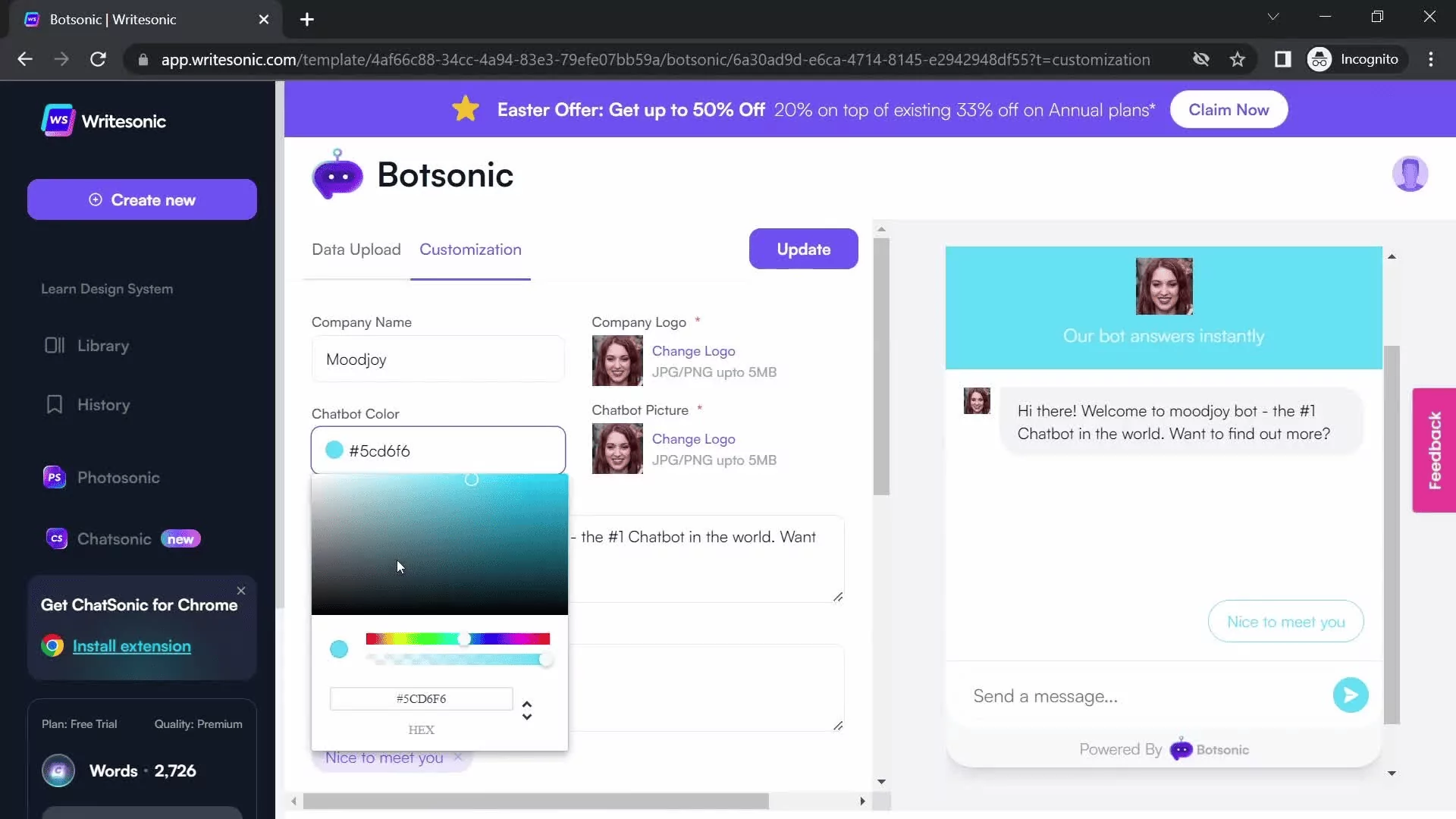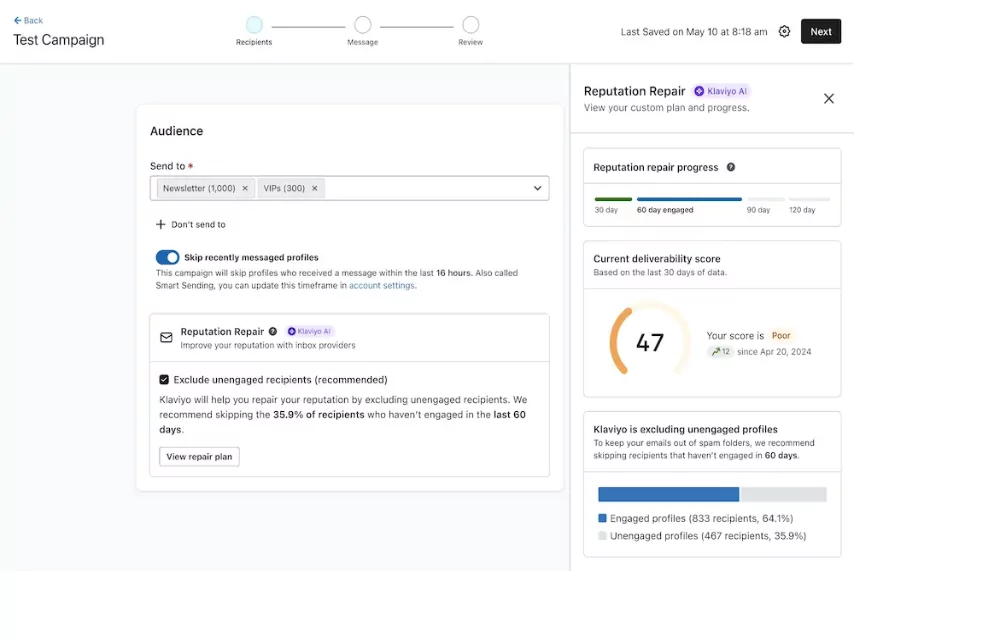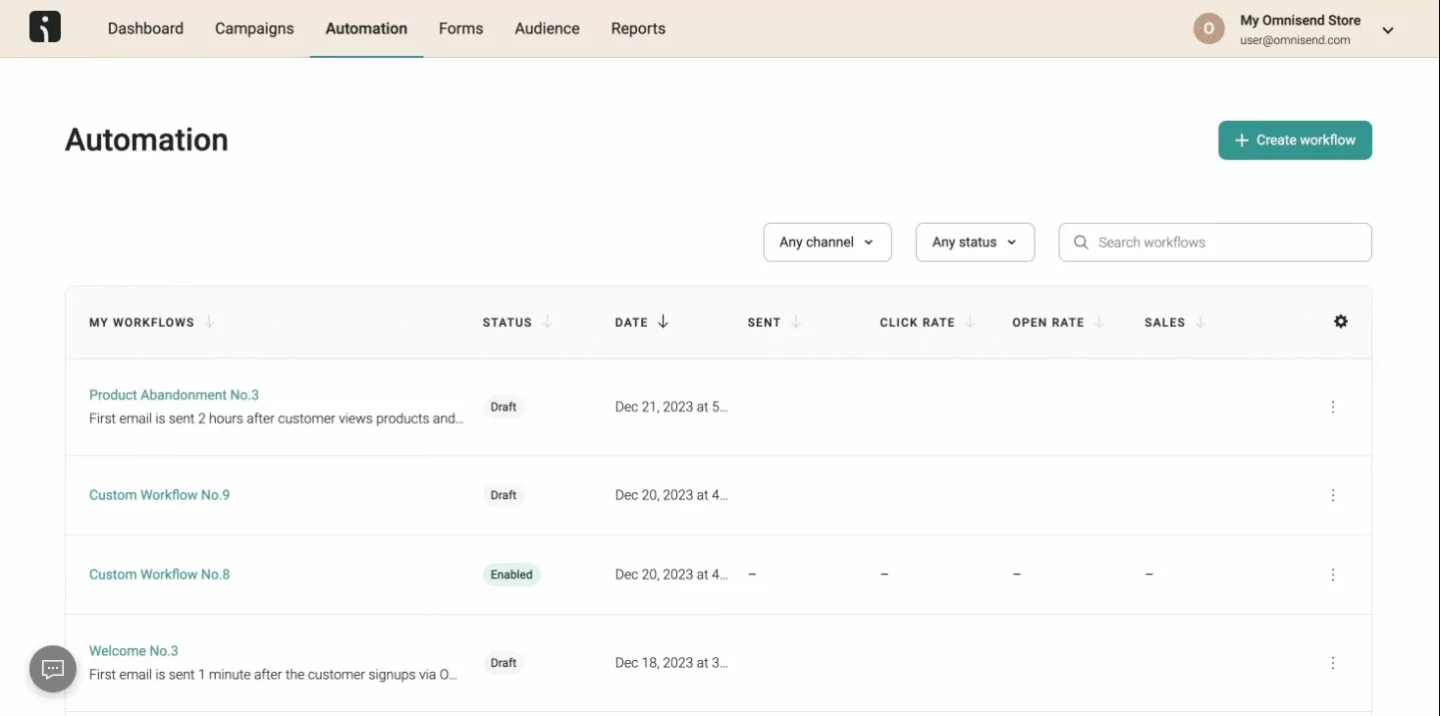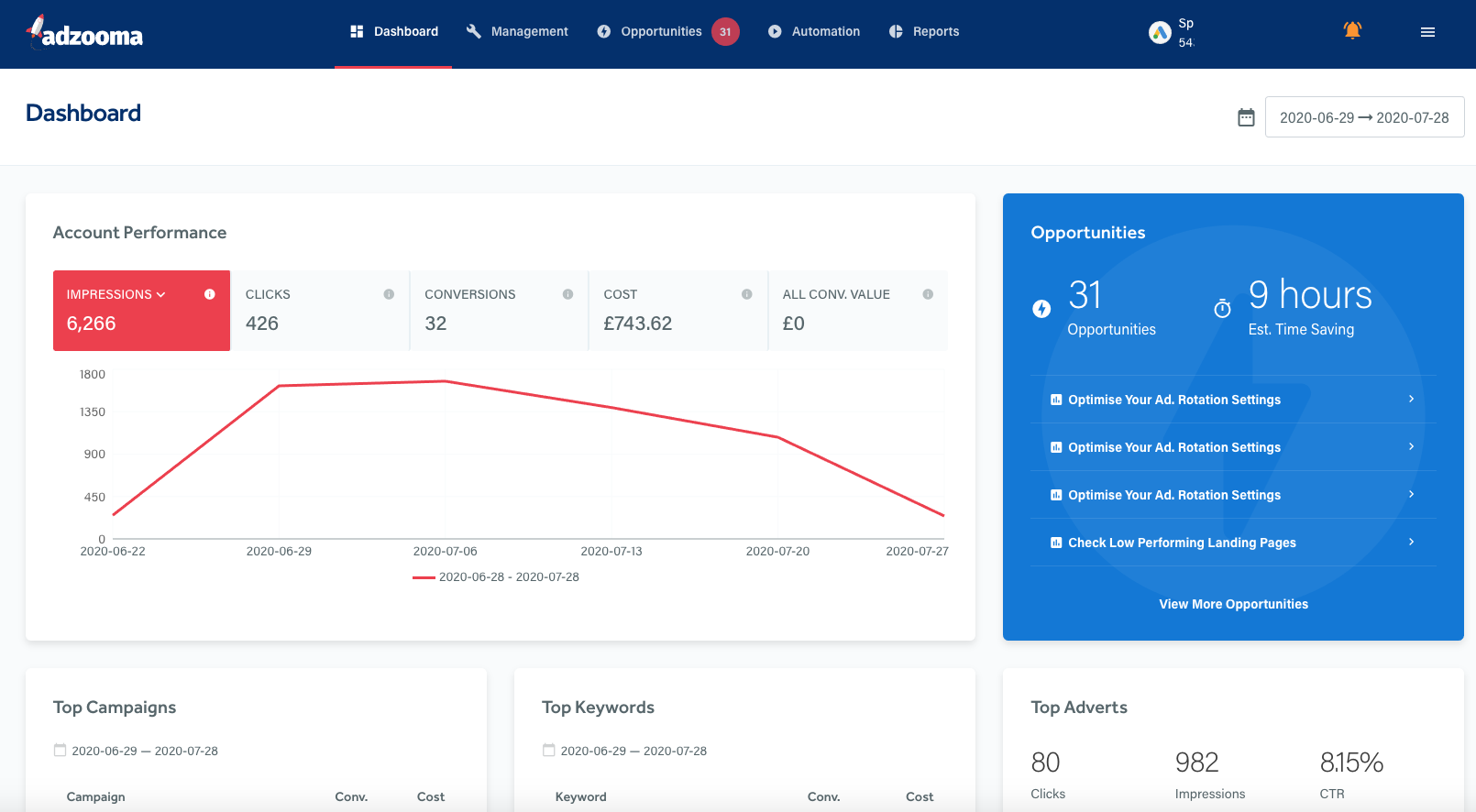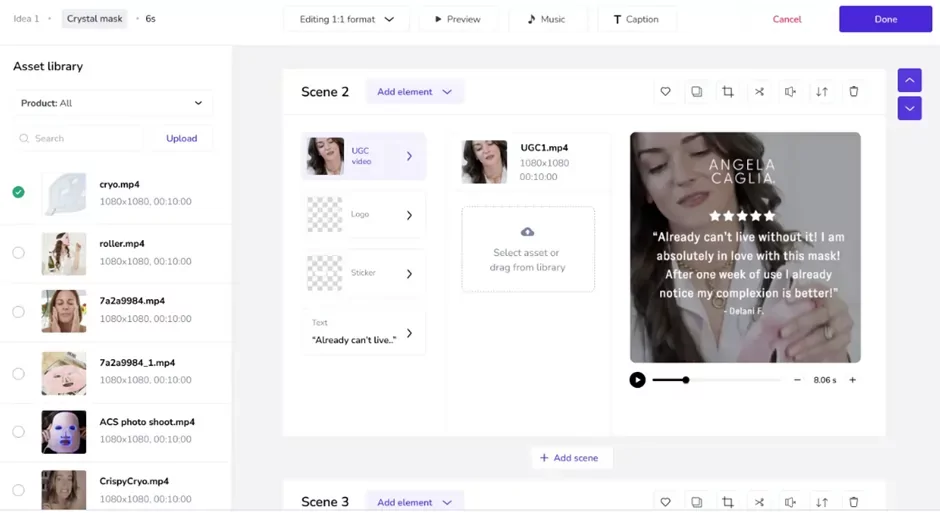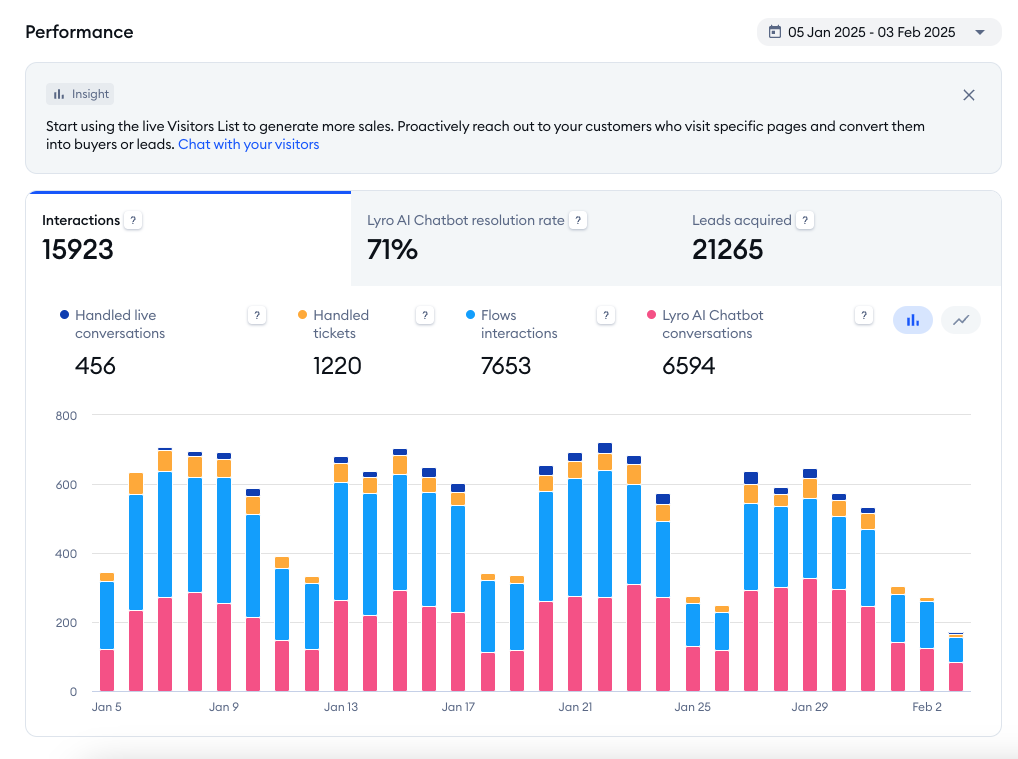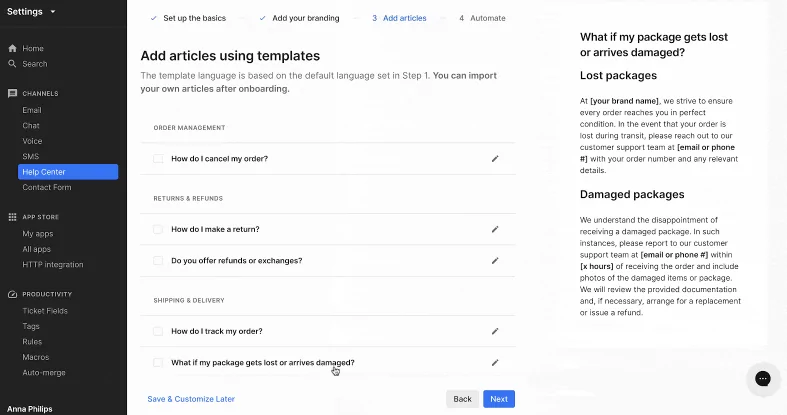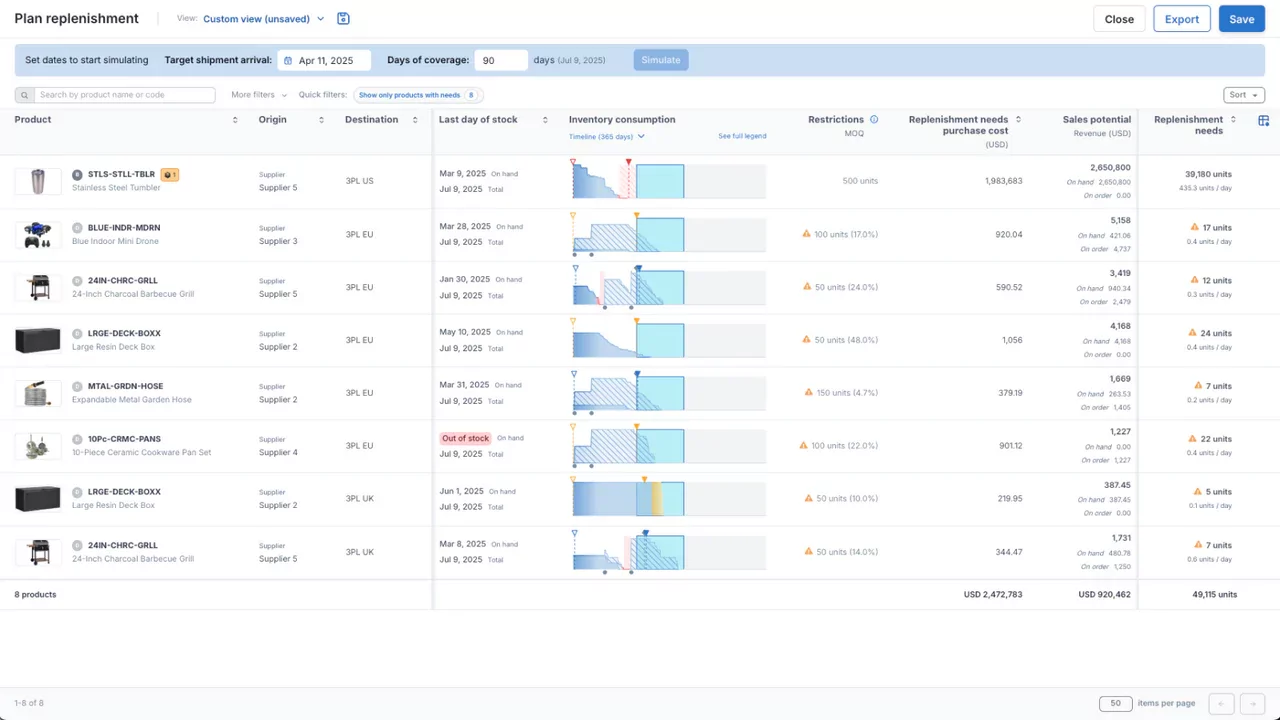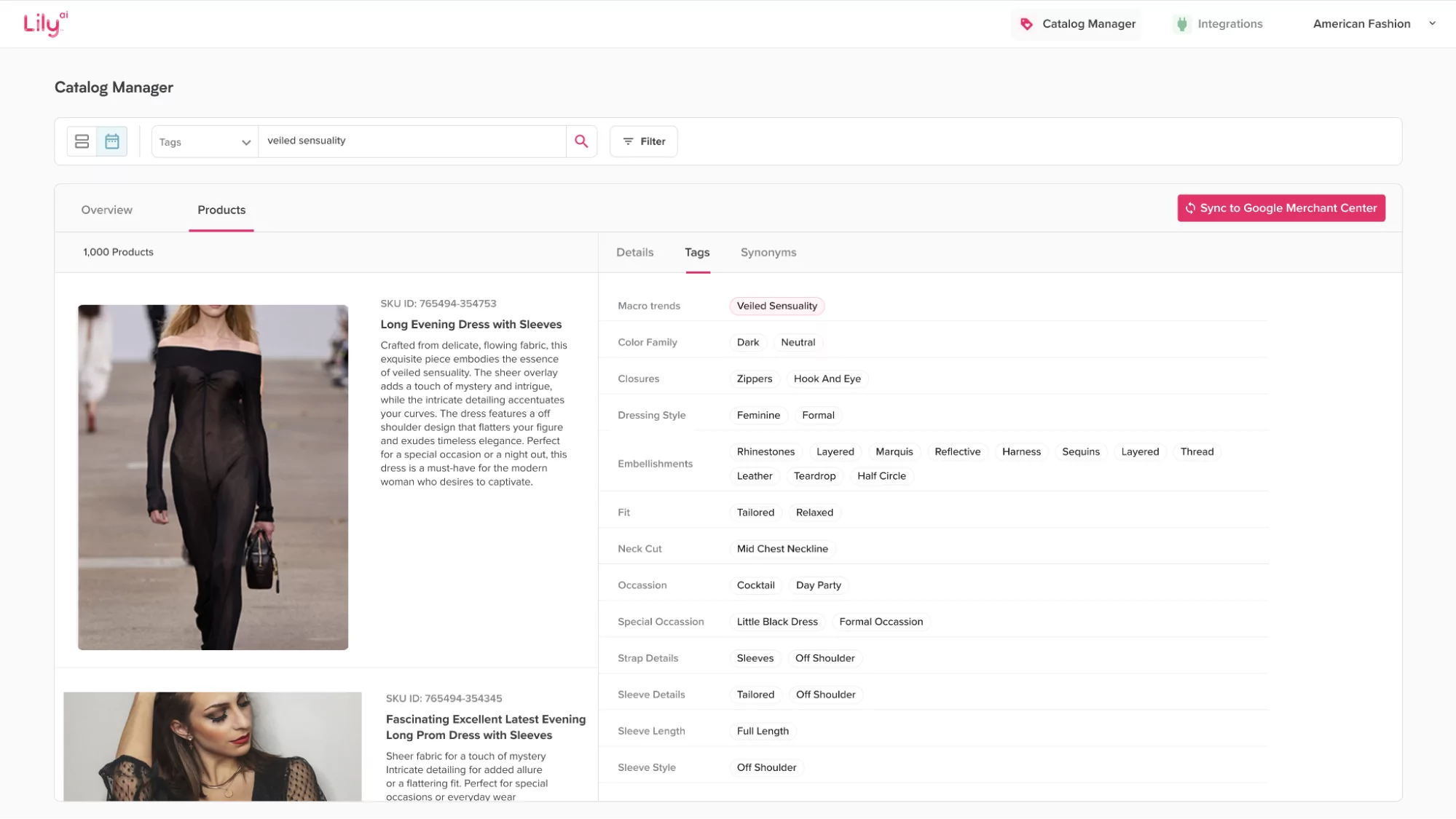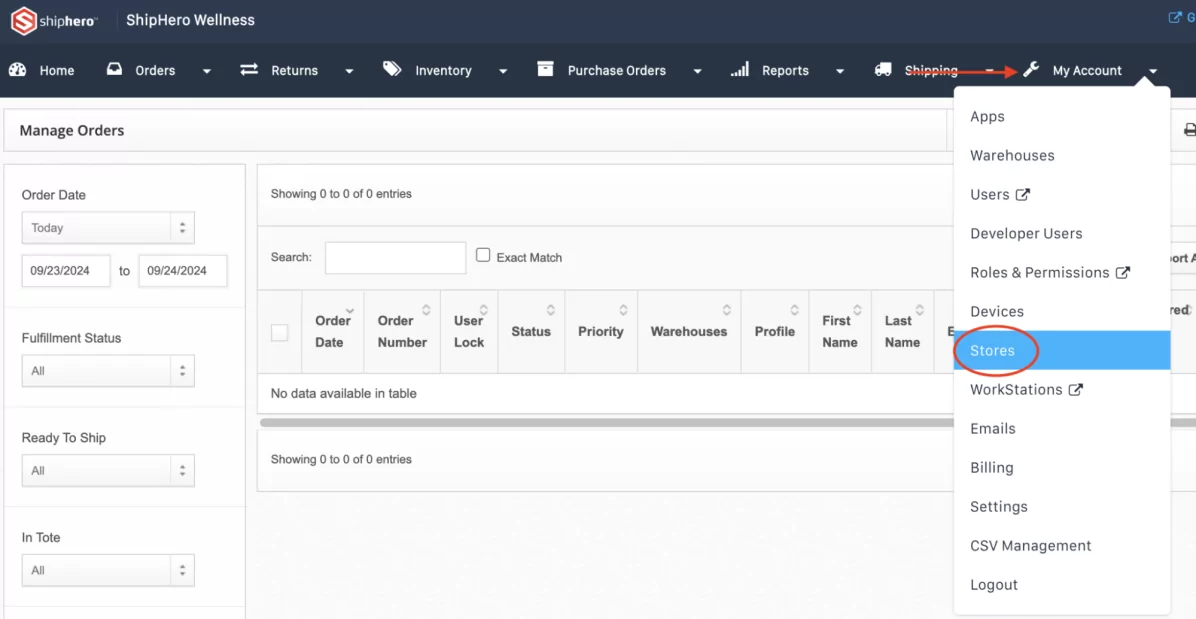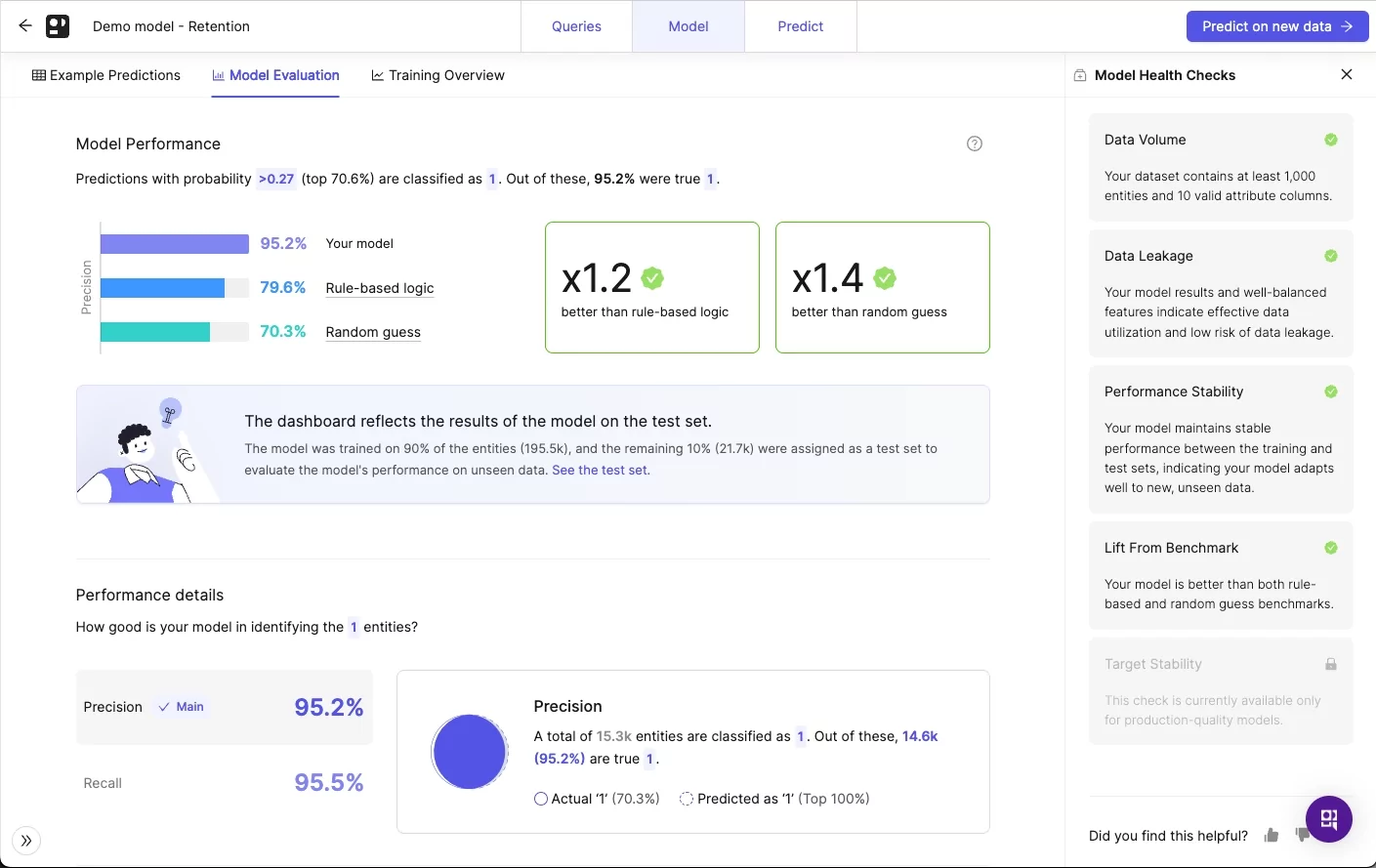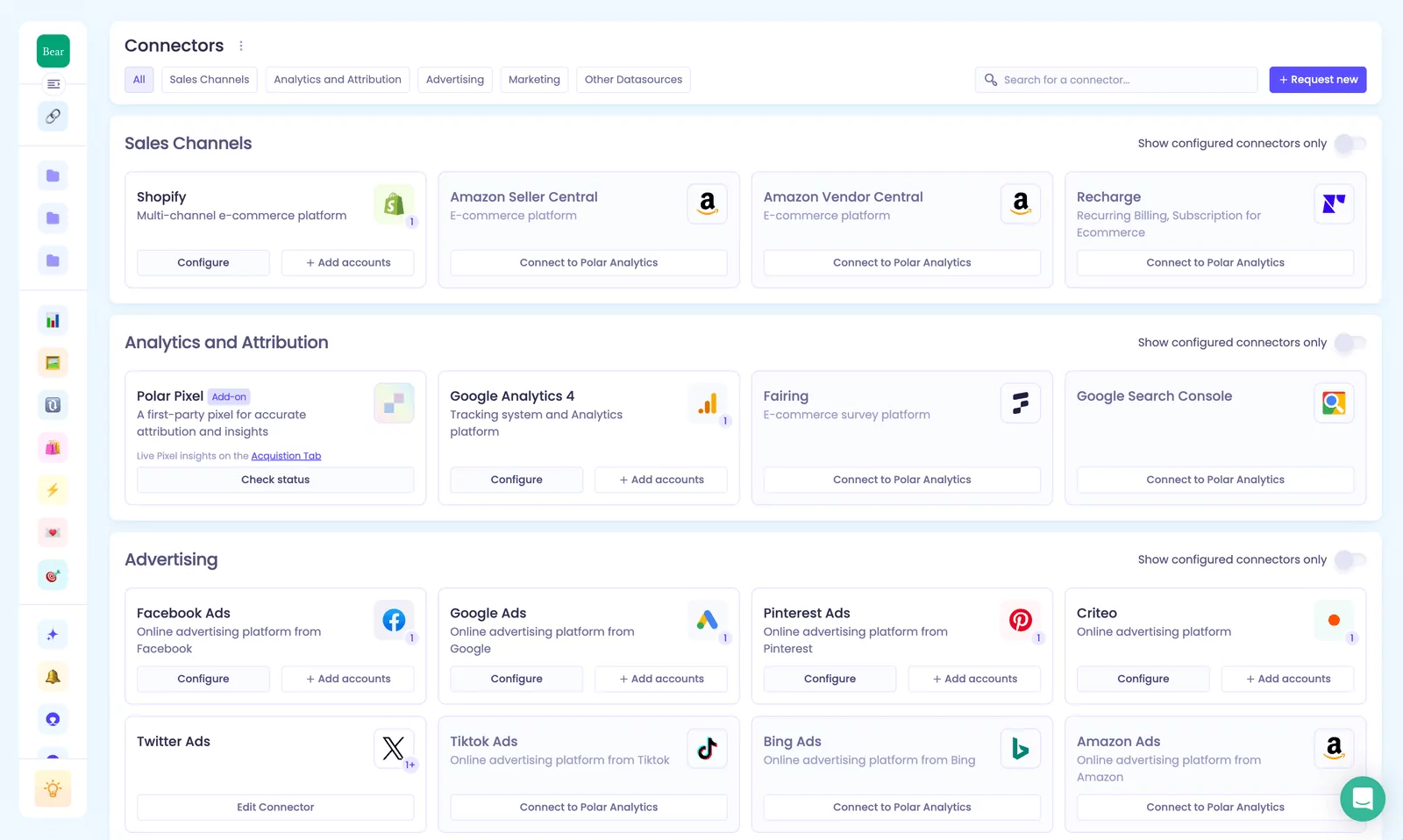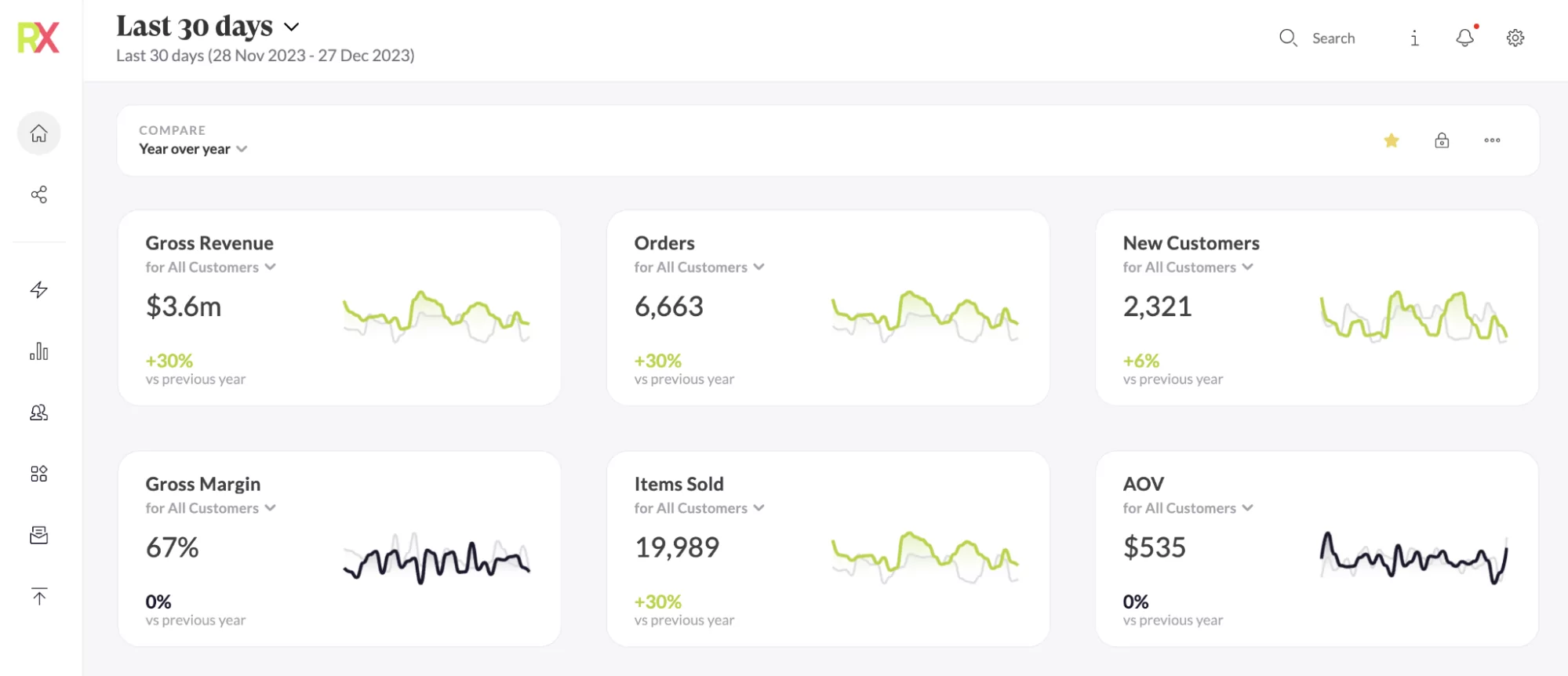Why Artificial Intelligence Is Critical to Ecommerce Success
Artificial intelligence helps simplify an ecommerce manager’s workload by automating repetitive tasks and collecting and analyzing large quantities of information.
This frees you up to focus on growing your online business and helps you make better decisions.
Whether you’re just launching your store or already have thousands of customers, artificial intelligence can help you move faster, work smarter, and deliver a better customer experience.
Here are just a few areas where AI is already making a difference:
- Customer support: For some businesses, AI chatbots now handle up to 80% of customer queries without human help.
- Email and marketing: AI tools like Klaviyo and Omnisend can segment customers and send campaigns when customers are most likely to engage.
- Product recommendations: Depending on the industry and how well businesses implement AI tools, personalization engines can achieve a 10–30% uplift in conversion rates, according to McKinsey.
- Operations: AI can predict inventory needs and reduce stockouts, even in complex subscription models.
According to Statista, 73% of global ecommerce and retail companies already use AI to improve operations or customer engagement.
And this is set to increase, as functions that once required big budgets and in-house developers can now be achieved through affordable, plug-and-play AI tools.
When used correctly, AI delivers powerful benefits. Just consider these stats:
- One study found that AI helped reduce shipping and logistics costs by up to 20%.
- AI can help reduce ecommerce inventory levels by up to 30% thanks to improved forecasting.
- Ecommerce customers make purchase decisions 47% faster when assisted by AI.
AI gives subscription businesses a competitive edge
Artificial intelligence is particularly effective for subscription businesses, where retention and efficiency are everything.
For example, AI can help identify when a subscriber is at risk of cancelling, automate retry logic for failed payments, and personalize offers or product bundles to boost long-term value.
It also streamlines backend operations, such as forecasting inventory for recurring orders or managing customer support at scale, allowing you to grow without increasing your workload.
With so many AI tools available, it’s easy to get distracted by big promises or trending apps. The following section helps you determine which ones to consider.
How to Choose the Right AI Tools for Your Business
The right AI tools depend on your business goals, your setup, and the stage you’re at. While it’s tempting to try them all, adding too many too quickly can cause more confusion than value.
Here’s how to choose AI tools that make your online business more efficient:
1. Identify pain points
Identify where your business processes or customer experience face problems on a day-to-day basis. For example, are you:
- Spending hours answering the same customer questions? Try a chatbot.
- Struggling to write product descriptions? Use an AI copywriter.
- Unsure how to target email campaigns? Go for AI-powered segmentation.
Do some research, using guides and round-ups (like this one!) to review the available solutions and find one that suits you.
Start small, one or two AI tools at a time, then layer in more once you’ve settled in and got results.
2. Make sure AI tools work with your existing tech stack
Before signing up for any AI tools, check whether they:
- Integrate with your ecommerce platform.
- Support your marketing strategies.
- Give you data you can use.
Avoid AI tools that create more work just to get up and running.
For example, suppose a tool promises to make your marketing more efficient but requires you to switch customer relationship management (CRM) platforms. In that case, it’s worth questioning whether it is worth it.
3. Focus on outcomes, not features
AI tools often promise a lot, but what matters is whether they help you:
- Save time
- Improve the customer experience
- Increase sales
- Reduce churn
For subscription businesses, retention is especially important. Prioritize AI tools that help you keep customers engaged month after month, whether that’s through smarter product recommendations, more relevant emails, or better insights into churn risk.
20 AI Tools for Ecommerce by Application
AI tools are now available for almost every part of running an ecommerce business.
They can launch your store, write product pages, handle support, and analyze customer data and behavior. This list categorizes them by use case, allowing you to find what’s most useful for your online business quickly
Website builders
-
Subbly
Best for: Subscription-first ecommerce businesses building long-term customer relationships.
Subbly is an ecommerce platform built specifically for subscription businesses. It comes with everything you need to manage subscriptions built in, including recurring billing, customer portals, prepaid plans, and churn-reduction tools, no code or plugins required.
To do this on other platforms like Shopify usually involves downloading third-party apps that are often limited and unreliable.
The platform also includes a new AI-powered website builder that helps you launch a fully functional store in minutes.
Subbly also uses AI to support core business functions. It includes automated dunning logic that detects failed payments and triggers personalized retry flows to reduce churn.
This makes it perfect for entrepreneurs building subscription box services, memberships, or recurring product businesses who want an all-in-one platform with built-in AI support.
However, Subbly isn’t designed for large multi-SKU retail operations or one-off flash sales at scale.
Features:
- AI-assisted store builder
- Subscription-first checkout
- Built-in analytics and retention tools
- Integrations via Zapier
Pricing:
- Basic: $39/month
- Subbly: $79/month
- Advanced: $159/month
- Subbly X: $499/month
All plans include a 14‑day free trial.
Reviews:
Capterra: 4.8/5
G2: 4.7/5
2. Wix ADI
Best for: First-time store owners who want an all-in-one platform with built-in design flexibility.
Wix Artificial Design Intelligence (ADI) builds websites based on your answers to a few simple questions. It creates a layout, adds relevant content, and even picks a design style for you.
It’s a good choice for beginners launching a store quickly without design experience. Ecommerce business owners can quickly create a branded online store with built-in ecommerce features like product listings, checkout, and payment integrations.
However, Wix is less suited to businesses with advanced ecommerce needs. It lacks native support for subscriptions, complex promotions, or multi-language stores.
Also, building custom features is challenging with Wix as it doesn’t allow full access to your site’s code or hosting environment. It also makes complex integrations, or moving your site to another platform tricky.
Features:
- Automated website creation
- Drag-and-drop editor
- Built-in ecommerce tools
- Mobile optimizatio
Pricing:
- Core (ecommerce) at $29/month
- Business at $39/month
- Business Elite at $159/month
Reviews:
TechRadar: 4.5/5
Capterra: 4.4/5
G2: 4/5
3. Bookmark AIDA
Best for: Solo founders launching a simple, single-product store who want the fastest possible setup and don’t need advanced features.
Bookmark’s Artificial Intelligence Design Assistant (AIDA) helps users build a website in minutes by answering a few simple questions.
The AI generates a custom layout and adds relevant content. You then adjust it using a visual editor.
Bookmark also includes an ecommerce module that supports product listings, inventory tracking, and digital downloads.
For small ecommerce businesses, it’s a fast way to get online without hiring a designer. You can accept payments, manage orders, and even run basic promotions.
That said, the platform is still limited compared to more robust ecommerce tools. Its store features are basic, and it lacks support for subscriptions, advanced analytics, or complex discount logic. If you’re planning to scale or need deep customization, you may outgrow it quickly.
Features:
- AI-generated website design
- Built-in ecommerce module
- Visual drag-and-drop editor
- Support for physical and digital products
Pricing:
Professional plan: $14.99/month (no ecommerce)
Business plan with ecommerce: $29.99/month
Reviews:
Capterra: 4.6/5
G2: 4.9/5
4. 10Web
Best for: WordPress users who want to speed up site creation and manage ecommerce via WooCommerce.
10Web is a WordPress-based AI builder that generates websites using AI prompts and a drag-and-drop editor.
It works well for small businesses that prefer the flexibility of WordPress and want to integrate WooCommerce for ecommerce features. You can recreate existing sites or build new ones quickly using its automation tools.
That said, 10Web isn’t as beginner-friendly as other platforms. You’ll need to manage plugins, updates, and configuration yourself, and most ecommerce features require additional setup through WooCommerce.
It’s best suited to users who already have some experience with WordPress and want more control over design and backend functionality.
Features:
- AI-generated WordPress websites
- WooCommerce integration
- SEO and speed optimization
- Website cloning tool
Pricing:
Starts at $10/month for basic plans; $11/month for ecommerce.
Reviews:
G2: 4.5/5
Content creation and SEO
5. Jasper
Best for: Ecommerce brands and teams producing high volumes of content across product pages, ads, and email marketing campaigns.
Jasper is a premium AI content creation tool built for speed and scale.
It offers pre-built templates for everything from product descriptions to email flows, and includes AI tools for maintaining a consistent brand voice across large volumes of content.
With support for multi-user workflows, tone training, and integrations with other AI tools like Surfer SEO, it’s well-suited to ecommerce businesses that need to publish regularly without hiring a full content team.
That said, Jasper is less suited to smaller businesses looking for a quick, low-cost writing assistant. It has a learning curve to get the most value out of features like brand voice and workflows, and its pricing is higher than many lightweight alternatives.
If you only need basic ad copy or product descriptions, a simpler tool like Copy.ai may be more cost-effective (read on to learn more).
Features:
- 50+ content creation templates
- Brand tone training
- Collaboration tools
- SEO mode with Surfer integration
Pricing:
- Creator: $39/mo annually or $49/mo month-to-month
- Pro $59 or $69
- Business: Custom pricing
7-day free trial available
Reviews:
G2: 4.7/5
Capterra: 4.8/5
6. Copy.ai
Best for: Small businesses who want fast, affordable AI copywriting for product pages, ads, and email subject lines.
Copy.ai is a lightweight AI writing assistant for fast short-form content creation. It’s ideal for creating product descriptions, meta tags, headlines, and email copy.
Its simple interface and free plan make it a good starting point for smaller businesses that want to test AI writing without a big investment.
However, Copy.ai isn’t designed for long-form content or complex collaboration. It lacks advanced brand voice controls, in-depth workflows, and integrations with other tools.
It’s not the best fit for teams managing large content creation pipelines or brands that need deeply customized output across multiple channels.
Features:
- 90+ content templates
- Multi-language support
- Simple UI for non-technical users
- Limited free plan
Pricing:
- Free plan available
- Premium starter plan: $49/month
- Advanced: $249/month
- Enterprise: Customer plans available
Reviews:
Capterra: 4.4/5
G2: 4.7/5
7. Surfer SEO
Best for: Businesses seeking to boost their website’s search engine rankings.
Surfer is a search engine optimization (SEO) tool that uses AI and real-time data to help you create content that ranks on platforms like Google.
It’s designed for blog posts, landing pages, and product content, and is especially useful for ecommerce businesses focused on growing organic traffic.
The content editor scores your writing based on keyword usage, headings, structure, and more, making SEO easier even if you’re not an expert.
That said, Surfer’s built-in AI writer is fairly limited. The quality of its auto-generated content is often generic, requiring significant editing to sound natural or on-brand.
Surfer also isn’t ideal for beginners looking for an all-in-one writing tool; it works best as a companion to a separate AI writer like Jasper or Copy.ai.
Features:
- Real-time SEO scoring
- Keyword clustering
- Search engine results pages (SERPs) analysis
- Content editor with AI
Pricing:
- Essential: $79/mo
- Scale: $175/mo
- Enterprise: Custom pricing
7-day trial available.
Reviews:
G2: 4.8/5
Capterra: 4.9/5
8. Writesonic
Best for: Those looking for a broad range of ecommerce-related content generation features.
Writesonic is an all-in-one AI content platform with tools for writing, SEO, chat automation, and image generation.
It’s one of the few AI ecommerce tools that has such a broad range of features all in one place.
What also sets it apart is its flexibility. You can choose from different AI models like GPT-4, GPT-3.5, and Claude to power it.
The built-in chatbot builder helps small ecommerce brands create 24/7 customer support or product recommendation tools without any technical setup. The image generation tool allows them to quickly create banners and product imagery.
That said, Writesonic does not consistently produce high-quality content. It performs best for short-form content and one-off tasks, but longer content like blogs or landing pages often requires editing.
It’s less suitable for teams needing a broad range of capabilities who have the resources available to improve their content where required.
Features:
- AI content generator (blogs, ads, product copy)
- AI chatbot builder (Botsonic)
- Built-in SEO assistant
- Image generation
- Supports GPT-3.5, GPT-4, Claude, and more
Pricing:
- Lite: $39/mo
- Standard: $79/mo
- Professional: $199/mo
- Advanced: $399/mo
- Enterprise: Custom pricing
Reviews:
Digital Marketing and Acquisition
9. Klaviyo AI
Best for: Small ecommerce brands that want to personalize and automate their email/SMS marketing.
Klaviyo is a marketing automation platform built for ecommerce. Its AI features help with audience segmentation, predictive analytics, and campaign timing.
You can automatically send personalized emails or SMS’s based on customer behavior, like browsing without buying or a subscription renewal coming up.
Klaviyo’s advanced segmentation and automation are powerful but come with a learning curve that may overwhelm smaller ecommerce teams.
The platform becomes expensive as your contact list scales, making it less suitable for early-stage businesses with tight budgets or simpler needs.
Features:
- AI-powered segmentation
- Predictive churn and LTV analysis
- Email and SMS flows
- Integrates with Subbly, Shopify, Stripe, and more
Pricing:
Free for up to 500 contacts. You pay to add different capabilities, with the cheapest starting at $25/month.
Reviews:
G2: 4.6/5
Capterra: 4.6
10. Omnisend
Best for: Businesses seeking granular segmentation and deep integration with enterprise tools.
Omnisend is an email and SMS marketing tool that uses AI to help ecommerce brands automate customer journeys.
It suggests send times, product recommendations, and subject line improvements. It’s ideal for smaller teams that want pre-built automation and a fast setup.
Omnisend’s features are impressive for omnichannel email and SMS marketing, but it lacks the depth of automation found in AI marketing tools like Klaviyo.
The reporting interface can feel limited compared to more advanced analytics platforms, and design flexibility in email templates is somewhat constrained.
While its free plan is generous, pricing can ramp up quickly based on your contact list and sending volume.
It may not be suitable for businesses with highly complex customer journeys, those seeking granular segmentation, or larger brands that require deep integrations across their enterprise systems.
Features:
- Drag-and-drop email builder
- Product recommendation blocks
- AI subject line helper
- Pre-built ecommerce workflows
Pricing:
Free for up to 250 contacts. Paid plans from $16/month.
Reviews:
G2: 4.6/5
Capterra: 4.7
11. Adzooma
Best for: Small businesses managing their own unsophisticated paid ad campaigns on Google, Facebook, or Microsoft.
Adzooma is an AI-powered ad management platform that connects to Google, Facebook, and Microsoft Ads.
It analyzes your campaigns and suggests optimizations based on budget, targeting, and performance history.
It’s a good choice for ecommerce founders managing their own paid ads, especially those who want quick, actionable insights without spending hours in ad dashboards.
That said, Adzooma’s AI tends to focus on surface-level adjustments, things like pausing underperforming ads or reallocating budget, rather than offering deeper strategic or creative recommendations.
Its suggestions can feel generic at times, and it’s not built for managing highly complex ad account structures.
It may not suit brands with large budgets, in-house PPC teams, or those advertising on platforms it doesn’t support, like TikTok or Pinterest.
Features:
- One-click optimization suggestions
- Campaign health scores
- Multi-platform ad management
- Performance tracking dashboard
Pricing:
Free plan available. Paid plans start at $49/month.
Reviews
G2: 4.3/5
Capterra: 4/5
12. Pencil
Best for: Product-led DTC brands seeking to optimize creative advertising.
Pencil uses AI to generate short-form video ads, making it a valuable tool for ecommerce brands running frequent paid campaigns on social media platforms.
It can save significant time and cost by producing multiple creative variations, learning from past performance to improve results over time.
Its integrations with Meta and TikTok make it especially useful for product-led DTC (direct-to-consumer) brands testing lots of creatives.
However, Pencil has a few drawbacks. The AI-generated videos can lack polish or originality, especially without human oversight.
Brands with strict visual identity guidelines may need to spend time editing the output or risk off-brand content.
It also works best when there’s existing performance data to learn from, so newer brands may not benefit as much initially.
Pencil isn’t ideal for businesses looking for longer-form video content, rich storytelling, or high-production-value campaigns.
Features:
- AI-generated ad creatives
- Performance prediction
- Multichannel exports (Meta, TikTok, Google)
- Integrates with product feeds
Pricing:
Plans start at $14/month.
Reviews:
G2: 4.8/5
Customer experience and retention
13. Tidio (Lyro)
Best for: Enterprise businesses seeking to automate 24/7 support across multiple channels.
Tidio combines live chat, helpdesk tools, and AI-powered chatbots into a single, easy-to-use platform.
Its standout feature, Lyro, uses conversational AI to automate answers to common customer questions.
This makes it a strong option for ecommerce businesses that want to provide fast, 24/7 support without hiring extra staff. It’s especially useful for small stores aiming to improve response times and reduce abandoned carts.
However, Tidio’s AI is best for handling simple, repetitive queries. Businesses with more complex products or high-touch customer service needs may find their responses too limited.
Some users also report that setting up advanced workflows or integrating with third-party systems can take time.
It’s useful for growing brands, but larger operations with dedicated support teams or custom tech stacks may need something more powerful.
Features:
- AI chatbot trained on your FAQs
- Live chat with human handoff
- Integration with Shopify, WordPress, and more
- Multilingual support
Pricing:
- The free plan includes 50 chats and 50 Lyro AI interactions per month.
- The starter plan starts at around $29/month for 100 agent conversations and base analytics.
- Lyro AI starts at $39/month for just 50 AI-powered chats.
Reviews:
G2: 4.7/5
Capterra: 4.7/5
TechRadar: 4/5
14. Gorgias
Best for: Ecommerce businesses with a budget to invest in rapidly scaling and streamlining support.
Gorgias is a customer support platform built specifically for ecommerce. Its AI tools help automate responses to common queries, detect customer intent, and prioritize urgent tickets.
It integrates with major platforms like Shopify, BigCommerce, and WooCommerce, centralizing support requests from email, chat, social, and SMS channels.
However, Gorgias can be expensive as your ticket volume increases, with pricing based on the number of billable interactions.
Brands with low support needs may find it hard to justify the cost. While the automation features save time, they still require setup and training to perform well, so they may not suit early-stage stores with limited resources. Some users also find the reporting tools less flexible than expected.
Overall, it’s best for fast-scaling ecommerce businesses ready to invest in streamlining support.
Features:
- AI-powered ticket automation
- Ecommerce integrations (Shopify, WooCommerce, etc.)
- Multi-channel inbox (email, chat, social)
- Revenue tracking from support
Pricing:
- Starts at $50/month for up to 300 tickets.
- Free trial available
Reviews:
G2: 4.6/5
Capterra: 4.6/5
Operations and fulfillment
15. Flieber
Best for: Mid-size businesses with existing inventory management systems, looking to scale further.
Flieber is an AI-driven inventory optimization tool designed for ecommerce brands that manage physical products across multiple sales channels.
It uses demand forecasting, historical sales data, and real-time inventory insights to help sellers avoid both stockouts and overstock.
For businesses juggling supply chains, warehouses, and marketplaces, Flieber can simplify planning and reduce capital tied up in unsold inventory.
However, Flieber is best suited to brands that already have some operational complexity, like multiple SKUs, international shipping, or multichannel sales. Smaller stores with low SKU counts or straightforward logistics may not get as much value from their forecasting capabilities.
It also assumes your sales and inventory data is clean and connected, so if your systems are messy or fragmented, setup can take time.
Flieber is best for mid-market brands looking to scale without inventory headaches.
Features:
- AI-powered demand forecasting
- Multi-warehouse support
- Channel-level visibility
- Integrations with Shopify, Amazon, and more
Pricing:
- Starts at $209/month.
- Free trial available.
Reviews:
G2: 4.7/5
16. Lily AI
Best for: Mid-sized businesses that want to improve product search.
Lily AI helps ecommerce brands improve product discovery by enriching product data with customer-centric language.
Using AI, it analyzes product images and descriptions, then tags items with detailed attributes, like style, occasion, or fit, so shoppers can find what they’re looking for more easily.
It’s especially useful for fashion, beauty, and homeware brands where subjective terms drive conversions.
Lily AI is most effective for businesses with large and varied product catalogs. Smaller brands or stores with limited SKUs may not need this level of enrichment or may not benefit significantly from the investment.
It also works best when integrated into a broader tech stack, including tools for functions like site search, personalized recommendations, or ad campaigns. Businesses without those tools may find themselves underusing Lily AI.
Lily AI is a strong fit for established retailers looking to scale discovery and personalization.
Features:
- Automated product tagging
- AI-generated attributes
- Category-specific models
- Integration with ecommerce platforms and PIMs
Pricing:
Custom pricing based on catalog size.
Reviews:
G2: 4.9/5
17. ShipHero
Best for: Businesses looking to outsource logistics, while also benefiting from automation and forecasting tools.
ShipHero is a warehouse management system (WMS) and third-party logistics (3PL) service, designed to streamline ecommerce operations.
Its AI-powered features help automate tasks like inventory syncing, order routing, and demand forecasting, making it easier for growing brands to scale without losing control of fulfillment.
It’s especially useful for DTC (direct-to-consumer) brands that need flexible, tech-driven logistics without hiring a warehouse team.
However, ShipHero may not suit smaller brands just getting started. It’s expensive and its focus on the US market means international fulfillment is more limited.
The AI software is powerful, but it has a steep learning curve. Brands with simpler fulfillment needs or global operations may want a more lightweight or globally distributed solution.
Features:
- Smart order routing
- Carrier rate shopping
- Barcode-based picking and packing
- Inventory syncing across channels
Pricing:
Prices start at $1,850/month, covering up to 10 store connections and five user seats.
Reviews:
G2: 4.4/5
Capterra: 4.2/5
Analytics and optimization
18. Pecan AI
Best for: Businesses with established datasets looking to measure campaigns and plan resources.
Pecan AI is a predictive analytics platform that helps ecommerce businesses forecast key metrics like sales, churn, customer lifetime value, and inventory demand.
It’s built for marketers and operations teams, offering no-code tools to create machine learning algorithms from raw business data, without needing a data science background.
It’s a good fit for mid-market and enterprise brands that want to turn historical information into proactive data-driven decisions, especially around campaign performance and resource planning. The user-friendly interface is intuitive, and it integrates with popular data warehouses and ecommerce tools.
However, Pecan AI may be overkill for early-stage brands without large datasets. The platform assumes a certain level of data maturity, so if your inventory or customer data is patchy or siloed, you may struggle to get meaningful results.
It’s also priced for scale, meaning it suits growing brands with decent datasets, ready to invest in predictive decision-making.
Features:
- No-code predictive analytics
- Churn and LTV prediction
- Automated model building
- Data integration support
Pricing:
Starts at $950/month.
Reviews:
G2: 4.8/5
Capterra: 5/5
19. Polar Analytics
Best for: Lean teams that need fast, actionable digital marketing and revenue insights.
Polar is a reporting and analytics tool built specifically for ecommerce brands. It connects to platforms like Shopify, Meta, TikTok, Google Ads, and Klaviyo to unify digital marketing and revenue data in one dashboard.
It uses AI to surface valuable insights, detect anomalies, and suggest budget optimizations, helping brands make faster, more informed decisions.
Polar also includes features like LTV tracking, blended ROAS, and creative performance breakdowns that are tailored to ecommerce marketing teams.
It doesn’t require heavy setup or custom SQL, and is built to deliver insights out of the box, making it perfect for brands with limited data resources or no in-house BI team.
Its reporting is fast and tailored to ecommerce, but it’s not highly customizable. This works well for lean teams that want quick, actionable insights, but it may not suit businesses with complex data needs or those that rely on custom reporting and attribution setups.
It’s especially geared toward tracking paid media performance, so brands that don’t run digital ads may not get as much value from its insights.
Features:
- Multi-source data aggregation
- Daily performance briefings
- Custom dashboards
- Subscription metrics (churn, MRR, LTV)
Pricing:
Paid plans from $720/month.
Reviews:
G2: 4.8/5
20. RetentionX
Best for: Ecommerce brands focused on growing LTV through better cohort and churn analysis.
RetentionX is an AI-driven analytics platform that helps ecommerce stores understand and grow customer lifetime value (CLV).
It segments customers, highlights churn risks, and suggests actions like customer loyalty offers or subscription tweaks.
Its strength lies in surfacing actionable insights around retention, repurchase behavior, and customer segmentation.
Its dashboards are optimized for standard ecommerce models, which means businesses with more complex or non-traditional sales cycles might find the insights less suitable.
In addition, while RetentionX automates a lot of detailed analytics, it can surface a lot of data, which may overwhelm smaller teams without someone dedicated to interpreting it.
It suits growing ecommerce brands with a decent data foundation, interested in boosting retention.
Features:
- Customer cohort analysis
- Churn prediction
- Revenue and LTV tracking
- Plug-and-play integrations with major ecommerce tools
Pricing:
- Users pay per customer, with the first 250 customers free. After that prices start at $10/month.
- Optional add-on packages available from $49 per month.
Reviews:
Shopify: 5/5
5. Maintain human oversight
AI should enhance your judgment, not replace it. Use AI to surface patterns, suggest next steps, or automate the repetitive parts of your business, but always review and refine as you go.
Keep an eye on how your automations are performing, and make sure your brand voice and customer experience remain consistent.
Use AI Where It Matters Most
From product recommendations and customer service to smarter forecasting and retention, AI ecommerce tools are already helping thousands of businesses run more efficiently and profitably.
But for subscription businesses, the impact is even greater. The recurring nature of your model means you have access to richer customer data and AI can help you act on it without extra headcount or complexity.
The biggest challenge is identifying where in the customer journey AI will provide benefits and which tool will help you achieve that.
If you’re already using Subbly, many of the capabilities covered here, like churn prediction, revenue forecasting, and automated dunning flows, are available out of the box. No separate tools or data wrangling required.
And if you’re not using Subbly yet, now’s the time to try it.

